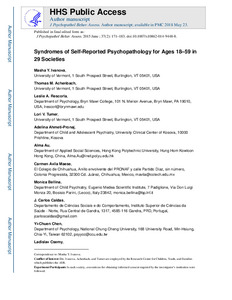Por favor, use este identificador para citar o enlazar este ítem:
https://repositorio.uca.edu.ar/handle/123456789/15565| Título: | Syndromes of self-reported psychopathology for ages 18-59 in 29 societies | Autor: | Ivanova, Masha Y. Achenbach, Thomas M. Rescorla, Leslie A. Tumer, Lori V. Ahmeti-Pronaj, Adelina Au, Alma Maese, Carmen Ávila Bellina, Mónica Caldas, J. Carlos Chen, Yi Chuen Csemy, Ladislav da Rocha, Marina M. Decoster, Jeroen Dobrean, Anca Ezpeleta, Lourdes Fontaine, Johnny R. J. Funabiki, Yasuko Gudmundsson, Halldór S. Harder, Valerie S. de la Cabada, Marie Leiner Leung, Patrick Liu, Jianghong Mahr, Safia Malykh, Sergey Maras, Jelena Srdanovic Marković, Jasminka Ndetei, David M. Oh, Kyung Ja Petot, Jean-Michel Riad, Geylan Sakarya, Direnc Samaniego, Virginia Corina Sebre, Sandra Shahini, Mimoza Silvares, Edwiges Ferreira de Mattos Šimulionienė, Roma Sokoli, Elvisa Talcott, Joel B. Vázquez, Natalia Zasępa, Ewa |
Palabras clave: | ADULTOS; EVALUACION PSICOPATOLOGICA; SOCIEDADES | Fecha de publicación: | 2015 | Editorial: | Springer | Cita: | Ivanova, M.I., et al. Syndromes of self-reported psychopathology for ages 18-59 in 29 societies [en línea]. Journal of Psychopathology and Behavioral Assessment. 2015, 37 doi:10.1007/s10862-014-9448-8 Disponible en: https://repositorio.uca.edu.ar/handle/123456789/15565 | Resumen: | Abstract: This study tested the multi-society generalizability of an eight-syndrome assessment model derived from factor analyses of American adults' self-ratings of 120 behavioral, emotional, and social problems. The Adult Self-Report (ASR; Achenbach and Rescorla 2003) was completed by 17,152 18-59-year-olds in 29 societies. Confirmatory factor analyses tested the fit of self-ratings in each sample to the eight-syndrome model. The primary model fit index (Root Mean Square Error of Approximation) showed good model fit for all samples, while secondary indices showed acceptable to good fit. Only 5 (0.06%) of the 8,598 estimated parameters were outside the admissible parameter space. Confidence intervals indicated that sampling fluctuations could account for the deviant parameters. Results thus supported the tested model in societies differing widely in social, political, and economic systems, languages, ethnicities, religions, and geographical regions. Although other items, societies, and analytic methods might yield different results, the findings indicate that adults in very diverse societies were willing and able to rate themselves on the same standardized set of 120 problem items. Moreover, their self-ratings fit an eight-syndrome model previously derived from self-ratings by American adults. The support for the statistically derived syndrome model is consistent with previous findings for parent, teacher, and self-ratings of 1½-18-year-olds in many societies. The ASR and its parallel collateral-report instrument, the Adult Behavior Checklist (ABCL), may offer mental health professionals practical tools for the multi-informant assessment of clinical constructs of adult psychopathology that appear to be meaningful across diverse societies. | URI: | https://repositorio.uca.edu.ar/handle/123456789/15565 | ISSN: | 0882-2689 | Disciplina: | PSICOPEDAGOGIA | DOI: | 10.1007/s10862-014-9448-8 | Derechos: | Acceso abierto | Fuente: | Journal of Psychopathology and Behavioral Assessment. 2015, 37 |
| Aparece en las colecciones: | Artículos |
Ficheros en este ítem:
| Fichero | Descripción | Tamaño | Formato | |
|---|---|---|---|---|
| syndromes-self-reported.pdf | 154,82 kB | Adobe PDF |  Visualizar/Abrir |
Visualizaciones de página(s)
66
comprobado en 27-abr-2024
Descarga(s)
107
comprobado en 27-abr-2024
Google ScholarTM
Ver en Google Scholar
Altmetric
Altmetric
Este ítem está sujeto a una Licencia Creative Commons

